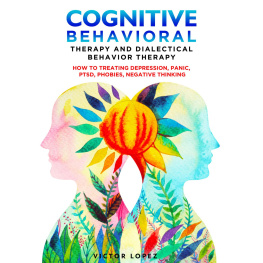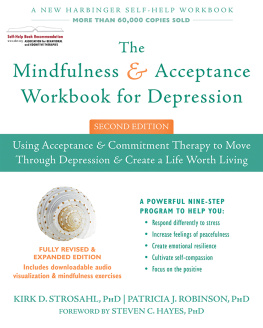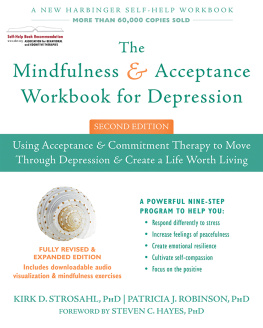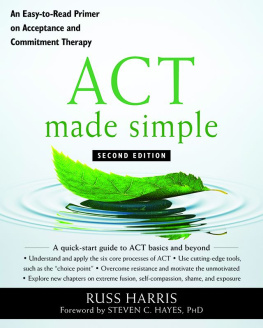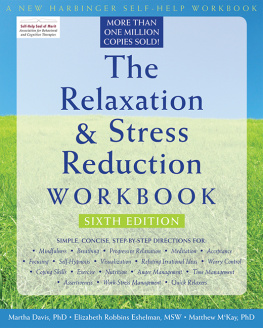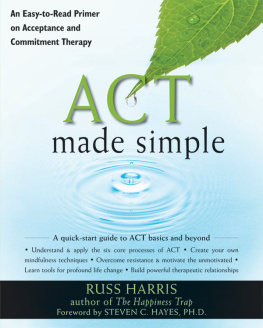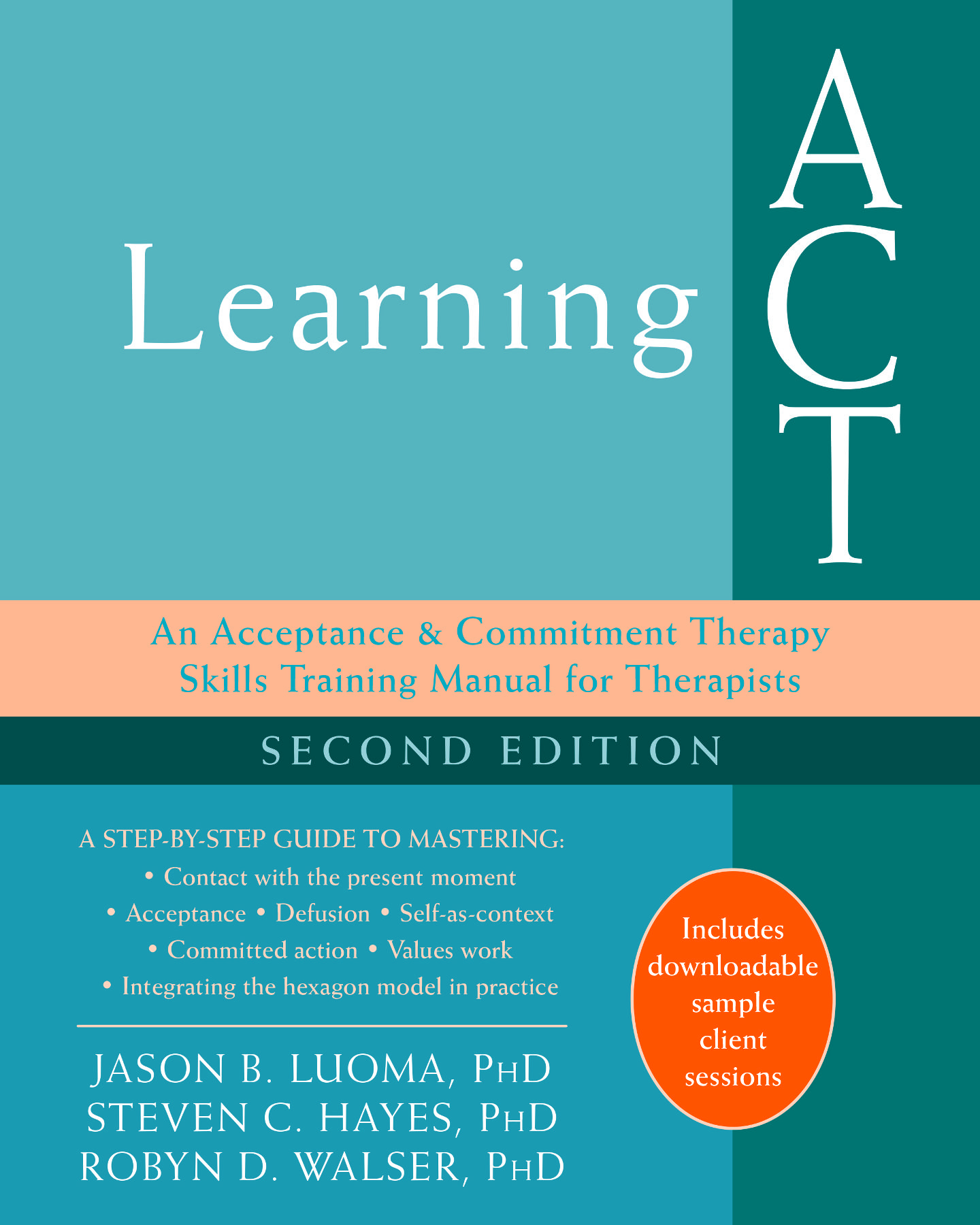
In this authoritative text, Luoma, Hayes, and Walser present a clearly written and practical step-by-step guide for therapists who are using acceptance and commitment therapy (ACT). Firmly rooted in contextual behavioral science and derived from a well-articulated theory, this text clearly describes and illustrates the concrete strategies to target a set of key processes that are critical to improve the lives of people. Every clinician should be familiar with it. It is a masterful book. I highly recommend it.
Stefan G. Hofmann, PhD, professor of psychology at Boston University, past president of the Association for Behavioral and Cognitive Therapies, and author of Emotion in Therapy
This second edition is an exceptional guide for the skillful and flexible implementation of ACT principles. The chapters outline the six core flexible ACT processes and their methods, with case examples and dialogues that bring the information to life. The book includes a unique and invaluable set of training tools and tests of core competencies. This is a masterful how to for ACT suitable for clinicians at any level of training and experience.
Michelle G. Craske, PhD, distinguished professor, and director of the Anxiety and Depression Research Center at the University of California, Los Angeles
Firmly grounded in contextual behavioral science (CBS), superbly organized with lucid and comprehensive explanation of all ACT concepts and competencies, and loaded with clinical pearls and pitfalls to avoid, this book lives up to the title and then some, as one of the best books for learning ACT. Further, the clinical vignettes and self-reflective exercises will deepen and advance the practice of more seasoned practitioners of ACT. The updated text and the new inclusion of an excellent chapter on culture and diversity make this edition more relevant and invaluable than ever in this diverse, globalizing world. This book is simply a must-have for any serious ACT practitioner!
Kenneth P. Fung, MD, FRCPC, MSc, associate professor in the department of psychiatry at the University of Toronto; clinical director of the Asian Initiative in Mental Health at the University Health Network; and president-elect of the Society for the Study of Psychiatry and Culture
ACT has been at the forefront of the pioneering third-wave cognitive behavioral therapies for many years. Not only has it uniquely linked the human evolution of language and symbol formation to mental processes that can cause suffering (relational frame theory [RFT]), but it has articulated six clear processes for therapeutic intervention centered around developing psychological flexibility. For both novice and expert therapists of any orientation, you could not want for a more clearly articulated, easily accessible, and therapeutically wise approach than this by these leaders and pioneers in the field. Full of therapeutic transcripts with clear, insightful descriptions of the therapeutic process, this beautifully written book is an outstanding contribution to therapeutic literature that is bound to become a classic and an essential text.
Paul Gilbert, professor at the University of Derby, creator of compassion-focused therapy (CFT), founder of the Compassionate Mind Foundation, and author of The Compassionate Mind
The tremendous dedication of thought and care Luoma, Hayes, and Walser infused into this second edition of Learning ACT is evident in the breadth and depth of every chapter. Their labor of love resulted in a preeminent and indispensable guide for novice and advanced ACT practitioners alike. Especially valuable are the fifty core competency exercises that stimulate experiential engagement. The chapter on adapting ACT to cultural contexts makes this a cutting-edge treatment for individuals from every walk of life who want to move in valued directions while welcoming all their thoughts and feelings.
Mavis Tsai, PhD, coauthor of A Guide to Functional Analytic Psychotherapy, and research scientist and clinical faculty at the University of Washington
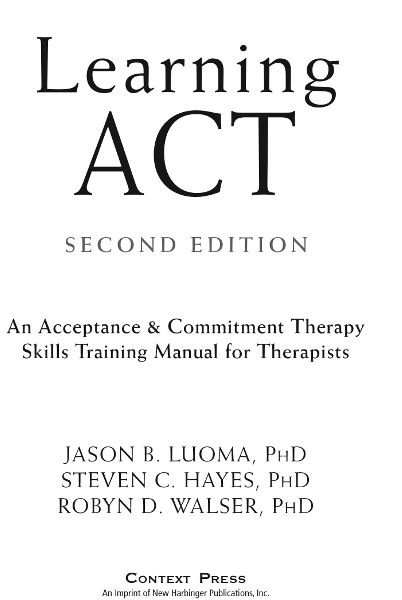
Publishers Note
This publication is designed to provide accurate and authoritative information in regard to the subject matter covered. It is sold with the understanding that the publisher is not engaged in rendering psychological, financial, legal, or other professional services. If expert assistance or counseling is needed, the services of a competent professional should be sought.
Distributed in Canada by Raincoast Books
Copyright 2017 by Jason B. Luoma, Steven C. Hayes, and Robyn D. Walser
Context Press
An imprint of New Harbinger Publications, Inc.
5674 Shattuck Avenue
Oakland, CA 94609
www.newharbinger.com
Cover design by Amy Shoup
Acquired by Catharine Meyers
Edited by Jasmine Star
Indexed by James Minkin
All Rights Reserved
Library of Congress Cataloging-in-Publication Data on file
To my partner, Jenna LeJeune, for your support, your sacrifice, and your faith in me.
JBL
I would like to dedicate this book to David H. Barlow, and to my fellow interns (Peter M. Monti, Kelly D. Brownell, A. Toy Caldwell-Colbert, and Carol Heckerman Landau) who worked under him in the first class of clinical psychology at Brown University, Department of Psychiatry and Human Behavior, 19751976 and who such showed patience and kindness in shaping up a wild man (that would be me) to be able to work with people.
SCH
I would like to dedicate this book to Susan L. Pickett. Thanks for the encouragement over the years and for always having faith in me.
RDW
Contents
This book was a team effort. To all those who read and provided feedback on drafts of these chapters, thank you. The exercises were particularly improved by those who piloted chapters of this book, including Mary Englert, Anne Shankar, Lianna Evans, Ross Leonard, Brendan Sillifant, Kevin Handley, Laura Meyers, Joanne Hersh, Jennifer Boulanger, and Jennifer Plumb. Thanks to the Portland ACT peer consultation group for their ideas about how to organize the book, exercises, and videos. Thanks to Joe Parsons for discussions about shaping therapist behavior, which influenced the exercises in this book. Thanks to those who provided feedback on the first edition including Donna Read, Ana Gallego, Miguel Lewis, Hiba Giacoletto, Brady Henderson, Petra Berg, Andrea Sieg, Kathleen Thorndike, Fred Kane, Magda Permut, Kaylin Jones, Sonia Combs, and the therapists at Lutheran Community Services of Spokane. Your input resulted in some large improvements in this edition, and your efforts will touch the lives of thousands of future readers and their hundreds of thousands of clients. All those people will never know that they should thank you for the time you put into improving the book.
To all of our clients who have honored us with their presence, trust, and courage. Without all of you, this book would not have been possible.
Thanks to those students and professionals who allowed themselves to be supervised by us and who taught their supervisors so much. Thanks to our editors, Jude Berman and Jasmine Star, for smoothing out our language and making our jargon more understandable.
Acknowledgment from individual authors:
Thank you to all those who helped me (JBL) learn ACT. When I first began studying ACT, I was blown away by the rigor and scope of the theory and was thoroughly confused by the technical language. I was rapidly able to utilize many of the metaphors and exercises, but didnt really understand how it all tied together. I needed a book about the in between moments. This is my attempt to write that book.
Next page

